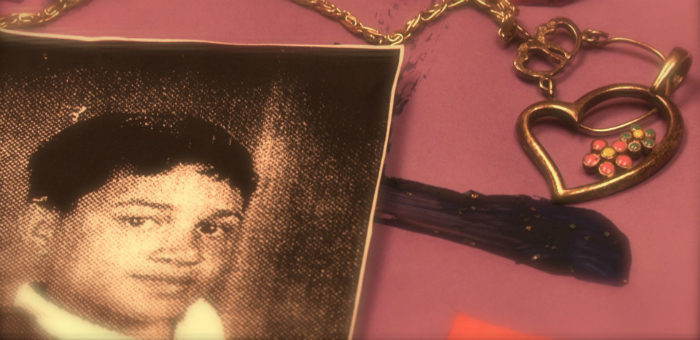Communal Intolerance: Cunningham Finds Apathy and Heartbreak In The Wake of Larry King’s Murder
Knowing in her heart that both the murder of a child and the imprisonment of another even younger are both wrong, Cunningham boldly looks beyond the bewildering headlines and the obvious certainties to give compassion and an air of understanding to both children through the aural perspectives of classmates, teachers, investigators, family members, prosecutors, defense attorneys and even jury members from the drawn out trial. Several of them, friend’s of Larry and their compassionate but professionally shunned teacher, were in the room when Brandon pulled the trigger. Physically reeling and drenched in tears, they recount the traumatic event moment for moment, the graphic photo evidence appearing onscreen to reinforce the woeful anguish in their quivering voices, but this is just to set the stage for the moral conundrum that follows.
We soon find, somewhat unsurprisingly, that Brandon was raised by a drug addicted mother and her increasingly abusive lover. He endured countless beatings by his makeshift father figure and audibly witnessed his mother being literally shot in the arm in the heat of a shouting match, yet the toxic family remained. His mother, brother and still devoted girlfriend all appear in the film, shocked by the events, yet sympathetic to the cause – and what’s most shocking about these findings is that they are not the only ones that feel this way. Teachers, community members, and even jury members publicly side with the young murderer, concluding that his actions were an act of self defense against Larry’s public acceptance of his own gender identity. Within a staunchly reciprocal narrative that weaves its copious characters into a double-sided depiction of extreme intolerance and an unyielding progressive hope in response, Cunningham pitches the idea that if raised in a community where bigotry is socially expected, it’s possible that Brandon McInerney is only slightly less a victim than Larry King.
It’s a hard reality to swallow, a truth only a brave filmmaker bearing a decree of tolerance would dare indulge. As a courageous new voice in non-fiction filmmaking, Marta Cunningham shows profound compassion for both of these tormented teens, while remaining prudently unapologetic in emotionally siding with King, his pro-LGBT supporters and anyone with any good sense. Made masterfully with the general populous in mind, her film aims for the heart with facts in hand and the expectation of empathetic waves of revulsion, rage, pity and mourning. Valentine Road may not be an easy path, but it’s certainly one the populous should promptly and impartially traverse.
